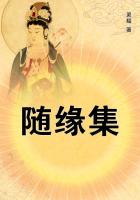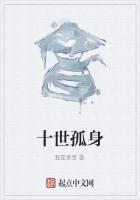Domini had never before understood how strangely, how strenuously, colour can at moments appeal to the imagination. In this pageant of the East she saw arise the naked soul of Africa; no faded, gentle thing, fearful of being seen, fearful of being known and understood; but a phenomenon vital, bold and gorgeous, like the sound of a trumpet pealing a great /reveille/. As she looked on this flaming land laid fearlessly bare before her, disdaining the clothing of grass, plant and flower, of stream and tree, displaying itself with an almost brazen /insouciance/, confident in its spacious power, and in its golden pride, her heart leaped up as if in answer to a deliberate appeal. The fatigue in her died. She responded to this /reveille/ like a young warrior who, so soon as he is wakened, stretches out his hand for his sword. The sunset flamed on her clear, white cheeks, giving them its hue of life. And her nature flamed to meet it. In the huge spaces of the Sahara her soul seemed to hear the footsteps of Freedom treading towards the south. And all her dull perplexities, all her bitterness of /ennui/, all her questionings and doubts, were swept away on the keen desert wind into the endless plains. She had come from her last confession asking herself, "What am I?" She had felt infinitely small confronted with the pettiness of modern, civilised life in a narrow, crowded world. Now she did not torture herself with any questions, for she knew that something large, something capable, something perhaps even noble, rose up within her to greet all this nobility, all this mighty frankness and fierce, undressed sincerity of nature. This desert and this sun would be her comrades, and she was not afraid of them.
Without being aware of it she breathed out a great sigh, feeling the necessity of liberating her joy of spirit, of letting the body, however inadequately and absurdly, make some demonstration in response to the secret stirring of the soul. The man in the far corner of the carriage turned and looked at her. When she heard this movement Domini remembered her irritation against him at El-Akbara. In this splendid moment the feeling seemed to her so paltry and contemptible that she had a lively impulse to make amends for the angry look she had cast at him. Possibly, had she been quite normal, she would have checked such an impulse. The voice of conventionality would have made itself heard.
But Domini could act vigorously, and quite carelessly, when she was moved. And she was deeply moved now, and longed to lavish the humanity, the sympathy and ardour that were quick in her. In answer to the stranger's movement she turned towards him, opening her lips to speak to him. Afterwards she never knew what she meant to say, whether, if she had spoken, the words would have been French or English. For she did not speak.
The man's face was illuminated by the setting sun as he sat half round on his seat, leaning with his right hand palm downwards on the cushions. The light glittered on his short hair. He had pushed back his soft hat, and exposed his high, rugged forehead to the air, and his brown left hand gripped the top of the carriage door. The large, knotted veins on it, the stretched sinews, were very perceptible. The hand looked violent. Domini's eyes fell on it as she turned. The impulse to speak began to fail, and when she glanced up at the man's face she no longer felt it at all. For, despite the glory of the sunset on him, there seemed to be a cold shadow in his eyes. The faint lines near his mouth looked deeper than before, and now suggested most powerfully the dreariness, the harshness of long-continued suffering.
The mouth itself was compressed and grim, and the man's whole expression was fierce and startling as the expression of a criminal bracing himself to endure inevitable detection. So crude and piercing indeed was this mask confronting her that Domini started and was inclined to shudder. For a minute the man's eyes held hers, and she thought she saw in them unfathomable depths of misery or of wickedness. She hardly knew which. Sorrow was like crime, and crime like the sheer desolation of grief to her just then. And she thought of the outer darkness spoken of in the Bible. It came before her in the sunset. Her father was in it, and this stranger stood by him. The thing was as vital, and fled as swiftly as a hallucination in a madman's brain.
Domini looked down. All the triumph died out in her, all the exquisite consciousness of the *******, the colour, the bigness of life. For there was a black spot on the sun--humanity, God's mistake in the great plan of Creation. And the shadow cast by humanity tempered, even surely conquered, the light. She wondered whether she would always feel the cold of the sunless places in the golden dominion of the sun.
The man had dropped his eyes too. His hand fell from the door to his knee. He did not move till the train ran into Beni-Mora, and the eager faces of countless Arabs stared in upon them from the scorched field of manoeuvres where Spahis were exercising in the gathering twilight.














